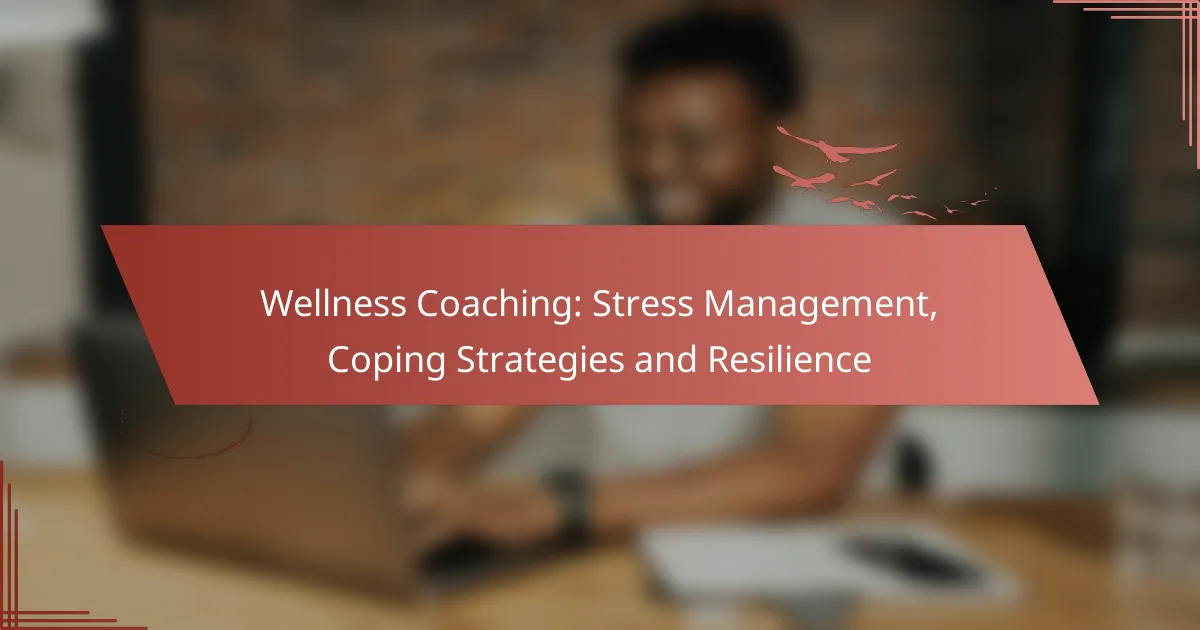Wellness coaching plays a vital role in stress management by equipping individuals with effective coping strategies and enhancing their resilience. Through personalized guidance, clients learn to identify their stressors and develop practical techniques to mitigate their effects, ultimately promoting better mental and physical health. By fostering resilience, wellness coaching empowers individuals to navigate challenges and improve their overall well-being.

What are effective stress management techniques in wellness coaching?
Effective stress management techniques in wellness coaching focus on enhancing personal resilience and coping strategies. These methods help individuals identify stressors and develop practical approaches to mitigate their impact on mental and physical health.
Mindfulness meditation
Mindfulness meditation involves paying attention to the present moment without judgment. This practice can reduce stress by promoting relaxation and increasing self-awareness, allowing individuals to respond to stressors more effectively.
To practice mindfulness, set aside a few minutes daily to sit quietly, focus on your breath, and observe thoughts as they arise. Aim for sessions lasting between 5 to 20 minutes, gradually increasing duration as you become more comfortable.
Breathing exercises
Breathing exercises are simple yet powerful tools for managing stress. Techniques such as deep breathing or the 4-7-8 method can activate the body’s relaxation response, helping to lower heart rate and reduce anxiety.
To perform the 4-7-8 technique, inhale through your nose for 4 seconds, hold your breath for 7 seconds, and exhale through your mouth for 8 seconds. Repeat this cycle 4 to 8 times, especially during moments of heightened stress.
Physical activity
Engaging in regular physical activity is a proven way to alleviate stress. Exercise releases endorphins, which can improve mood and promote a sense of well-being.
Incorporate at least 150 minutes of moderate aerobic activity, such as brisk walking or cycling, into your weekly routine. Even short bursts of activity, like a 10-minute walk, can significantly impact stress levels.
Time management strategies
Effective time management strategies can help reduce stress by creating a sense of control over your schedule. Prioritizing tasks and setting realistic goals can prevent overwhelm and enhance productivity.
Consider using tools like to-do lists or digital planners to organize tasks. Break larger projects into smaller, manageable steps and allocate specific time blocks for each task to maintain focus and reduce procrastination.
Journaling
Journaling is a therapeutic technique that allows individuals to express thoughts and feelings, which can help clarify emotions and reduce stress. Writing about daily experiences can provide insights into stress triggers and coping mechanisms.
Set aside time each day or week to write in a journal. Focus on your feelings, challenges, and achievements. Aim for 10 to 15 minutes per session, and consider using prompts to guide your writing if you’re unsure where to start.

How can wellness coaching improve coping strategies?
Wellness coaching enhances coping strategies by providing personalized guidance and support tailored to individual needs. Coaches help clients identify stressors and develop effective techniques to manage them, fostering resilience and emotional well-being.
Personalized coping plans
Personalized coping plans are essential in wellness coaching as they address the unique challenges each individual faces. Coaches work with clients to assess their stress triggers and create strategies that fit their lifestyles, preferences, and goals.
For example, a personalized plan might include mindfulness practices, time management techniques, or physical activity tailored to the client’s schedule. Regular reviews ensure the plan remains effective and adaptable to changing circumstances.
Skill-building workshops
Skill-building workshops are interactive sessions that teach clients practical techniques for managing stress and enhancing resilience. These workshops often cover topics such as emotional regulation, communication skills, and problem-solving strategies.
Participants can practice new skills in a supportive environment, gaining confidence and competence. Workshops may be held in-person or online, making them accessible to a wider audience.
Support group facilitation
Support group facilitation provides a space for individuals to share experiences and coping strategies with others facing similar challenges. These groups foster a sense of community and belonging, which can be crucial for emotional support.
Facilitators guide discussions, ensuring that all voices are heard and that the group remains focused on constructive coping strategies. Regular participation can help individuals feel less isolated and more empowered in their stress management efforts.

What role does resilience play in wellness coaching?
Resilience is crucial in wellness coaching as it helps individuals effectively cope with stress and adversity. By fostering resilience, clients can develop the ability to bounce back from challenges, enhancing their overall well-being and mental health.
Building emotional strength
Building emotional strength involves developing the capacity to manage feelings and respond to stressors in a healthy way. Techniques such as mindfulness, journaling, and emotional regulation strategies can help individuals recognize and process their emotions more effectively.
Practicing gratitude and self-compassion can also contribute to emotional resilience. For instance, setting aside a few minutes each day to reflect on positive experiences can strengthen emotional fortitude over time.
Developing a growth mindset
A growth mindset is the belief that abilities and intelligence can be developed through effort and learning. This perspective encourages individuals to view challenges as opportunities for growth rather than insurmountable obstacles.
To cultivate a growth mindset, clients can focus on setting realistic goals, embracing feedback, and celebrating small achievements. Engaging in continuous learning, whether through courses or self-study, can further reinforce this mindset.
Enhancing adaptability
Enhancing adaptability allows individuals to adjust to new situations and challenges with ease. This skill is essential in navigating life’s uncertainties and can be developed through exposure to varied experiences and environments.
Practicing flexibility in daily routines, such as trying new activities or altering plans when necessary, can improve adaptability. Additionally, maintaining a positive outlook during transitions can help individuals embrace change rather than resist it.

What are the benefits of wellness coaching for stress management?
Wellness coaching offers numerous benefits for stress management, including personalized strategies to cope with stressors and enhance resilience. By working with a coach, individuals can develop effective coping mechanisms and improve their overall mental well-being.
Improved mental health
Engaging in wellness coaching can lead to significant improvements in mental health by providing tailored support and resources. Coaches help clients identify stress triggers and develop strategies to manage anxiety, leading to reduced symptoms of depression and increased emotional stability.
Techniques such as mindfulness, cognitive restructuring, and relaxation exercises are often incorporated, allowing individuals to cultivate a more positive mindset. Regular sessions can reinforce these practices, making them habitual and effective in daily life.
Increased productivity
Wellness coaching can enhance productivity by teaching clients how to manage stress effectively, which often leads to better focus and efficiency. When stress is managed well, individuals are more likely to meet deadlines and achieve their goals without feeling overwhelmed.
Coaches may introduce time management techniques and prioritization strategies, helping clients allocate their time wisely. This structured approach can lead to a noticeable increase in output and a more satisfying work experience.
Better work-life balance
Achieving a better work-life balance is a key benefit of wellness coaching, as it encourages individuals to set boundaries and prioritize self-care. Coaches assist clients in recognizing the importance of downtime and leisure activities, which are essential for reducing stress.
Strategies may include scheduling regular breaks, engaging in hobbies, and ensuring quality time with family and friends. By fostering a balanced lifestyle, individuals can mitigate burnout and enhance their overall quality of life.

How to choose a wellness coach for stress management?
Choosing a wellness coach for stress management involves evaluating their qualifications, experience, and approach to coping strategies. Look for coaches who specialize in stress reduction techniques and have a background in psychology or wellness practices.
Qualifications to look for
When selecting a wellness coach, prioritize those with relevant certifications in stress management or health coaching. Credentials from recognized organizations can indicate a solid foundation in effective techniques. Additionally, consider their educational background in psychology, counseling, or related fields.
Experience and specialization
Experience is crucial; seek coaches who have worked with clients facing similar stress-related challenges. Specialization in specific areas, such as workplace stress or anxiety management, can enhance their effectiveness. Ask for testimonials or case studies to gauge their success with previous clients.
Coaching approach and techniques
Different coaches employ various methods for stress management, such as mindfulness, cognitive-behavioral techniques, or holistic approaches. Understand their coaching style and ensure it aligns with your preferences. A good coach should tailor their strategies to your individual needs and goals.
Cost and availability
Consider the cost of coaching sessions, which can vary widely based on experience and location. In the U.S., rates may range from $50 to $300 per hour. Check the coach’s availability to ensure they can accommodate your schedule, and inquire about package deals for multiple sessions.
Initial consultation
Many wellness coaches offer an initial consultation, often free or at a reduced rate. Use this opportunity to assess their communication style, approach, and whether you feel comfortable working with them. This meeting can provide valuable insights into their methods and compatibility with your needs.
